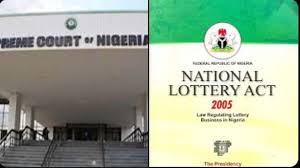The Speaker of the House of Representatives, Rt Hon Tajudeen Abbas, on Friday, said that the lottery industry in Nigeria contributed over N200 billion to the nation’s Gross Domestic Product (GDP) in 2023 on a day the Supreme Court declared the National Lottery Act of 2005 unconstitutional.
The Speaker spoke at the formal unveiling of a book titled: “Mr. Lottery, The Story of Lanre Gbajabiamila@60. The subject matter is the incumbent Director General, National Lottery Regulatory Commission (NLRC).
Rt. Hon. Abbas, who was the Special Guest of Honour at the book presentation, was represented by the Deputy Speaker of the House of Representatives, Rt Hon Benjamin Kalu, who said, “Under the leadership of Lanre Gbajabiamila, the lottery industry contributed over N200 billion to the country’s GDP in 2023.
“Today we gather to mark the life of a man whose living has become a testimony and light for others to emulate. We are proud of you. You have provided a place for the Parliament to support you, to sustain the good work you are doing. As we all know, it is not the end.
“Lottery has a series of chances and choices, each of them to know about the darkness. Each decision leads to a long, wide journey. And just as in every game, it’s not the outcome that defines us, but how we play together, how we rise after a fall. How we learn, how we adapt, and how we shape the game to serve a higher purpose. The story of Lanre idealises one such story. A story made in the game of lottery. Not for personal gain, but to contribute to lottery”.
Noting that the concept of lottery is not foreign to us in Nigeria, Abbas explained that “it was rooted deeply in our community of lottery, where we come together, pooling resources, sharing goals, taking risks”.
Supreme Court Declares National Lottery Act Unconstitutional
Meanwhile, nineteen years after the National Assembly enacted the National Lottery Act 2005, the Supreme Court on Friday nullified the enforcement of its provisions in the 36 states of the federation because they were unconstitutional.
A seven-member apex court panel in a unanimous judgment held that the National Assembly lacked the powers to legislate on issues relating to lottery and games of chance. The court held that such powers only reside with the state Houses of Assembly, which possess exclusive authority over lottery and games of chance.
The lead judgment by Justice Mohammed Idris ordered that the National Lottery Act 2005 should no longer be enforced in all states, except the Federal Capital Territory (FCT), in respect of which the National Assembly is empowered to make laws.
Former President Olusegun Obasanjo signed the National Lottery Bill 2005 into law in March 2005, a legislation that provides the framework for the operation of the national lottery and the establishment of the National Lottery Regulatory Commission.
The commission regulates the business of lottery in Nigeria while establishing the national lottery trust fund. In 2008, the Lagos state government filed a suit against the federal government on whether the control and regulation of gaming and lottery businesses in each state is under the exclusive list.
Ekiti state Government in October 2020, joined Lagos as co-plaintiff in the suit. Two years later, in November 2022, the Supreme Court joined 33 state governments as co-defendants in the suit.
Justice Mohammed Idris, who delivered the unanimous judgement of the court specifically held that such powers belong exclusively to the Houses of Assembly of the States of the federation.
He held that having regard to the clear provisions of Section 4 (2) & (3) of the Constitution, the National Assembly lacks the powers to make any legislation for the control and regulation of lottery in Nigeria.
Concerning Section 4(4)(a) & (b) and Part 2 of the Second Schedule of the Constitution, the apex court held that matters relating to the lottery are not issues on which the National Assembly and state Houses of Assembly have concurrent powers to make laws.
Justice Idris also declared that, having regard to the provisions of Section 4(7)(a) & (c) of the First Schedule to the Constitution, the House of Assembly of Lagos State and other states have the powers, to the exclusion of the National Assembly, to make laws for the regulation and control of lottery within their states.
He further declared that having regard to the provisions of Sections 4(4)(b), 7(a), and 39, 29(9)(a) of the Constitution, the power of the National Assembly to make laws for the regulation and control of lottery is limited by the Constitution.
The judge also declared that Sections 17, 18, 19, 20, and 21 of the National Lottery Act 2005, made by the National Assembly, are inconsistent with the Constitution, adding that the National Lottery Act is inconsistent with the provisions of the 1999 Constitution.


More Stories
New Tax Regime Commences January 2026 as President Signs Tax Reform Bills into Law
Alumni Treasure and National Transformation
The “Sins” of Fubara Leading to A State of Emergency by Attorney General